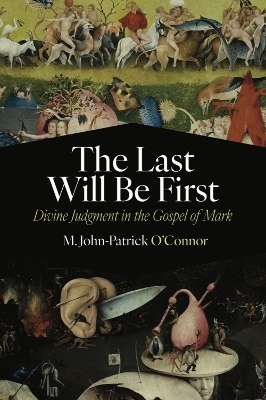
The Last Will Be First
Divine Judgment in the Gospel of Mark
Seiten
2024
Baylor University Press (Verlag)
978-1-4813-1999-7 (ISBN)
Baylor University Press (Verlag)
978-1-4813-1999-7 (ISBN)
Rather than continue to neglect the theme of God’s judgment for a modern world, M. John-Patrick O’Connor suggests that Christian communities ought to improve upon their ""grammar of judgment"" by judiciously evaluating the ""who,"" the ""what,"" and the ""why"" of God’s judgment and by considering the historic use and abuse of such language.
To contemporary sensibilities, the idea of divine judgment can seem at best off-putting, at worst a reason to jettison the biblical text altogether. Long gone are the days of Puritan preachers and their fiery, turn-or-burn tirades--but should preachers and teachers wholly avoid the topic of divine judgment? In the words of Dostoyevsky's character Ivan in The Brothers Karamazov, "What good can hell do, since those children have already been tortured?" Or, as Mary Ann Tolbert asks, "What happens when the text is read, not by the marginalized but by the oppressor, not by the colonized, but by the colonizer?"Rather than continue to neglect the theme of God's judgment for a modern world, M. John-Patrick O'Connor suggests that Christian communities ought to improve upon their "grammar of judgment" by judiciously evaluating the "who," the "what," and the "why" of God's judgment and by considering the historic use and abuse of such language. O'Connor's journey toward better theologies of judgment begins with the Gospel of Mark. While readers of Scripture most frequently associate divine judgment in the New Testament with Matthew, Luke, or Paul, The Last Will Be First claims that Mark's Gospel offers an equally robust vision of God's judgment upon evil and, crucially, God's justice for the "least of these."
After cataloguing the range of divine judgment language in the Hebrew Bible and Second Temple Judaism, O'Connor turns to the second Gospel, proposing that God's judgment as portrayed in Mark is for the purpose of defending God's children. O'Connor demonstrates that Mark participates in a well-established "grammar of judgment" that can be dispensed in a variety of contexts while retaining God's role as the primary agent of judgment. To that end, this book also hopes to build a constructive theology of judgment for readers of Mark, with a hopeful vision for the gospel's ongoing relevance in a world still marked by oppression.
To contemporary sensibilities, the idea of divine judgment can seem at best off-putting, at worst a reason to jettison the biblical text altogether. Long gone are the days of Puritan preachers and their fiery, turn-or-burn tirades--but should preachers and teachers wholly avoid the topic of divine judgment? In the words of Dostoyevsky's character Ivan in The Brothers Karamazov, "What good can hell do, since those children have already been tortured?" Or, as Mary Ann Tolbert asks, "What happens when the text is read, not by the marginalized but by the oppressor, not by the colonized, but by the colonizer?"Rather than continue to neglect the theme of God's judgment for a modern world, M. John-Patrick O'Connor suggests that Christian communities ought to improve upon their "grammar of judgment" by judiciously evaluating the "who," the "what," and the "why" of God's judgment and by considering the historic use and abuse of such language. O'Connor's journey toward better theologies of judgment begins with the Gospel of Mark. While readers of Scripture most frequently associate divine judgment in the New Testament with Matthew, Luke, or Paul, The Last Will Be First claims that Mark's Gospel offers an equally robust vision of God's judgment upon evil and, crucially, God's justice for the "least of these."
After cataloguing the range of divine judgment language in the Hebrew Bible and Second Temple Judaism, O'Connor turns to the second Gospel, proposing that God's judgment as portrayed in Mark is for the purpose of defending God's children. O'Connor demonstrates that Mark participates in a well-established "grammar of judgment" that can be dispensed in a variety of contexts while retaining God's role as the primary agent of judgment. To that end, this book also hopes to build a constructive theology of judgment for readers of Mark, with a hopeful vision for the gospel's ongoing relevance in a world still marked by oppression.
M. John-Patrick O'Connor is Associate Professor of New Testament at Northwest University.
Introduction: The Use and Abuse of Divine Judgment
1 Divine Judgment in the Hebrew Bible
2 Divine Judgment in Early Apocalyptic Literature
3 Divine Judgment in the Early Roman Empire
4 The Nature of Judgment in Mark
5 The Rhetoric of Divine Judgment in Mark
Conclusion: The Mikra of Mark
| Erscheinungsdatum | 10.07.2024 |
|---|---|
| Verlagsort | Waco |
| Sprache | englisch |
| Maße | 140 x 216 mm |
| Themenwelt | Religion / Theologie ► Christentum ► Kirchengeschichte |
| ISBN-10 | 1-4813-1999-X / 148131999X |
| ISBN-13 | 978-1-4813-1999-7 / 9781481319997 |
| Zustand | Neuware |
| Haben Sie eine Frage zum Produkt? |
Mehr entdecken
aus dem Bereich
aus dem Bereich
von Athanasius bis Gregor dem Großen
Buch | Softcover (2024)
C.H.Beck (Verlag)
12,00 €


